I Smell Trouble (blues song)
I Smell Trouble (blues song)
“I Smell Trouble” is a blues credited by Don Robey, first recorded in 1957 by Bobby "Blue" Bland.
Label owner, songwriter, producer Don Robey's name should be on any serious list of early pop/R&B pioneers. His Duke-Peacock family of labels boasted an impressive roster: Johnny Ace, Bobby "Blue" Bland, Big Mama Thornton, Clarence "Gatemouth" Brown, the Dixie Hummingbirds, O.V. Wright, Carl Carlton, the Five Blind Boys of Mississippi, Inez Andrews, Memphis Slim, Little Junior Parker, Little Eddie Taylor, Joe Hinton, and more.
I Smell Trouble
Born on the 1st of November, 1903, in Houston’s Fifth Ward, Don D. Robey had a pretty unremarkable childhood until he dropped out of school aged just 16, to become a professional gambler. He was obviously quite successful because within five years he could be found owning/managing his own taxi business. It’s never been clear whether he owned the business, or just managed it on behalf of someone else, but that sort of cloudy distinction was to be a feature of Don’s business dealings throughout his career.
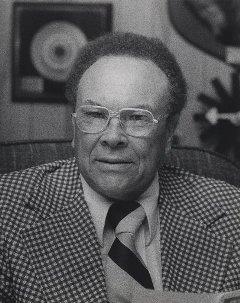
Don Robey
One of his passions was music and although it’s not known when Don became involved in promoting dances, but by 1939 he had moved to Los Angeles where he gained employment as the manager of The Harlem Grill, a well known night club that featured live acts. Sometime in 1942, Don returned to Houston and worked on the fringes of the entertainment industry for a couple of years until he opened his own club called The Bronze Peacock Dinner Club in 1945.
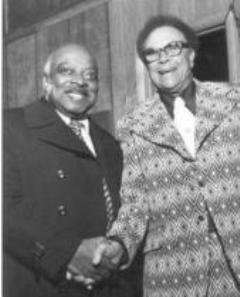
Count Basie & Don Robey
Although a complete list of artists that appeared at the club is not known, there are details that Ruth Brown, Louis Jordan, Lionel Hampton, and T-Bone Walker were among the club’s featured guests.
What is known, is in 1947, Don Robey became involved in artist management for the first time when he agreed to represent a local Houston Blues singer called Clarence 'Gatemouth' Brown. The arrangement was obviously profitable for both Robey and Brown though, because two years later Don Robey decided that he wanted to record Clarence ‘Gatemouth’ Brown. Being the entrepreneurial type, rather than go to an established label, where he might lose some control, Don Robey just decided to set up his own record label. So, in late 1949, Peacock Records was formed.
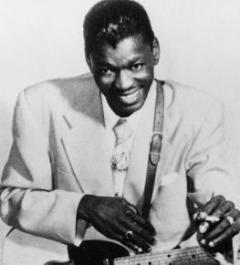
Clarence 'Gatemouth' Brown
In 1952, Robey merged his Peacock label with Dave Mattis' Duke Records of Memphis, TN, and Duke-Peacock was born. Robey took over full ownership of the label in 1953. Signed to Duke were legendary blues singer Johnny Ace and Roscoe Gordon.
Johnny Ace had three number one R&B hits: "My Song," which held the top spot for nine weeks during the fall of 1952; "The Clock," which was number one for five weeks in summer 1953; and "Pledging My Love," which was number one for ten weeks. The singer's legend only increased when he was fatally shot during a backstage game of Russian Roulette at Houston's City Auditorium, dying the following day on December 25, 1954.
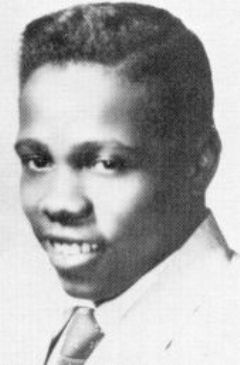
Johnny Ace
Another early Duke-Peacock star was Little Junior Parker. A cousin of Al Green and a bandmate of Howlin Wolf, the singer/harmonica player first hit the charts with "Feelin' Good" by Little Junior's Blue Flames on Sun Records, which hit number five R&B in fall 1953.
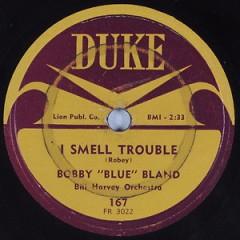
Bobby 'Blue' Bland - I Smell Trouble, cd
Duke-Peacock's all-around biggest R&B star was Bobby "Blue" Bland. A bandmate of Ace, Gordon, and Parker in the Beale Streeters and a Duke artist before the merger, Bland first charted with "Farther Up the Road," a number one R&B hit in fall 1957.
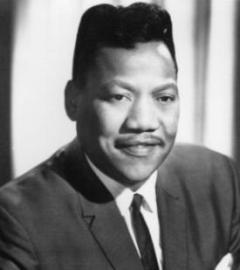
Bobby 'Blue' Bland
In 1957, Robey started Back Beat, an R&B label that had hits with O.V. Wright, Joe Hinton, and Texas rock-country singer/guitarist Roy Head and the Traits. Also signed to Back Beat was rock group the Rob Roys, which included future hit composer/producer Charles Fox ("Happy Days"). Carl Carlton, whose two biggest hits were the 1981 million-seller "She's a Bad Mama Jama" and "Everlasting Love," got his first big break through Don Robey.
Robey sold his music holdings — more than 2,700 song copyrights and hundreds of artist contracts, to ABC Dunhill in 1973. Two years later, on June 16, he died of a heart attack at his home. Robey was one of the first African-Americans to own a highly successful record label in the U.S., predating Motown's Berry Gordy by more than a decade.
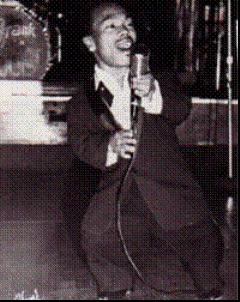
Little Eddie Taylor
Don Robey’s reputation as a hard bargaining business man was growing in line with the success of the label’s records. It’s also claimed that his reputation as a gangster ! It’s often acknowledged that he conducted negotiations with artists with a .45 revolver on his desk, and had a tendancy to brandish it in the air at sticky points in the negotiations. It’s also rumoured that he was well connected with the local mobsters. Certainly, back in the late Fifties / early Sixties, it would have been impossible for anyone in the entertainment business to not be aware of, and deal with organised crime, and don’t forget Don Robey had been in this business for nearly fifteen years by now.
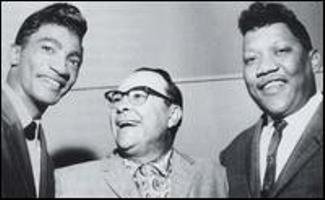
Al 'TNT' Braggs, Don Robey & Bobby 'Blue' Bland
In his book “The Death of Rhythm and Blues,” Nelson George paints a slightly different picture. George revealed that Robey regularly bought his artists Cadillacs when they asked for them, expensive clothes and cash advances, some of which were never repaid, if the borrowing artist did not have a hit.
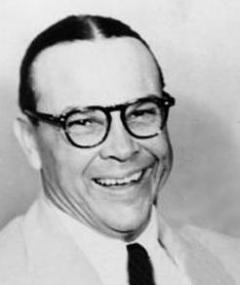
Don Robey
“Robey was a pioneer who gave black talent a shot, a black surviving in a racist industry,” Nelson George said. “Robey, like the Chess Brothers in Chicago, Herman Lubinsky at Savoy and others, took the economic risks. They took the gamble. They deserved to benefit. No question.”
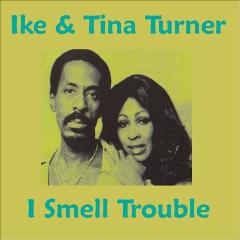
Ike & Tina Turner - I Smell Trouble
I Smell Trouble Lyrics
Lord knows I try, to do what's right One whole long year I stayed home both day and night 'Cause I smell-a, hmmm, trouble, way over yonder way up there ahead of me Yes, worries and troubles, Lord, they just won't let me be People talk about me, both night and day I said, "Lord, please forgive them and go the other way" 'Cause I smell-a, hmmm, trouble, Lord, I smell trouble ahead of me Yes, worries and troubles, Lord, they just won't let me be And from now on, I will not run and hide I'll face trouble with s smile, and hope it pass me by 'Cause I smell-a, hmmm, trouble, way over yonder way up there ahead of me Yes, worries and troubles, they just won't, they just won't, they just won't let me be Oh yeah








